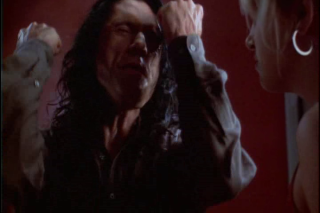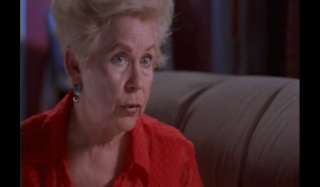Plot Summary
The Good
The Bad
Judgment
Closing
Back to Top
Plot Summary
Everything in the life of Johnny (Tommy Wiseau) seems to be going well: he’s lined up for a promotion at work, he’s about to marry his girlfriend of seven years (Lisa, played by Juliette Danielle), and he’s surrounded by friends. However, little does Johnny know that his world of easygoing trust is about to collide head on with the truth of a betrayal of all he holds dear.
Although he lives there, Johnny risks it all when he enters The Room!
Back to Top
The Good
The first 30 minutes of The Room are a bizarre quasi-softcore porn hurdle (sex scenes make up 1/3 of it at least) that needs to be leaped in order to arrive at the movie’s middle. And what a middle. Although it should really take a viewer out of the movie, this movie’s middle is like a sweet cream filling while the first and last 30-35 minutes are like a low-grade chocolate shell. What matters, though, is that this set up works.
As the movie’s events heat up and become more dramatic Wiseau’s curious delivery makes all of his intense lines unintentionally hilarious. This is, after all, the home of the internet-famous
Speaking of Lisa, it’s refreshing to see an average, real woman featured in the female lead role of a movie such as this.
Back to Top
The Bad
Although Wiseau’s acting often has a tinge of the (unintentionally) comedic, the movie as a whole doesn’t share in the same off-yet-endearing quality.
For starters, several side characters are introduced and then forgotten like so many Scooby-Doo villains, and quite unnecessarily. For example, we’re introduced to Mike (Mike Holmes) and Michelle (Robyn Paris) fairly early in the movie, but they don’t survive into the third act, as Mike is nowhere to be seen at Johnny’s party.
What’s more, Mike and Michelle, as a fellow couple, could easily have been the source of advice for Johnny and Lisa. Instead, for the space of a couple of scenes we get Peter (Kyle Vogt), the psychologist friend. Even stranger is the third act introduction of a mysterious man in a white button up shirt at Johnny’s party who is the one who finds out about Lisa’s and Mark’s betrayal.
Much more importantly for a movie called The Room, the setting is really unclear. We’re definitely watching a story in San Francisco, and that takes part in an apartment building of some sort for the most part. But what kind of apartment is difficult to nail down. Some establishing shots suggests a modest apartment building:
Others suggest a townhouse:
Perhaps the movie’s uncertain setting is simply meant to make the titular room more expansive than one four-walled enclosure, but this lack of clarity is distracting.
Along with the uncertain setting and character introductions, a couple of side plots are mentioned but then just forgotten.
Denny’s run-in with drugs and owing drug money? Apparently solved after Johnny and Mark attack the drug dealer.
Claudette’s troubles with her brother and a house she’s looking to sell? Just noted, and never returned to.
Both of these sideplots feed into the movie’s drama, but developing and integrating either or both would have given it a much more consistent feel.
Back to Top
Judgment
Decidedly a weird one to watch, The Room has its merits (it inspired its own indie flash game after all).
Wiseau’s strange, quasi-high/drunk, almost entirely eye-contact-less acting style makes all of his dramatic scenes utterly laughable. But as a result the movie’s drama is almost always turned on its head and rendered ineffective. Coupled with an awkward handling of what can only be assumed to be an attempt to make Johnny’s apartment a main character, too much of the movie’s acting and writing undermine the possibility of it all being taken seriously.
The Room is good for a laugh, but its uneven characters, settings, and side stories hamstring its ability to be anything more.
So, Freya, let this one be. It lay already in a prominent place, splayed across a crumbling battlement – there shall all who desire to shall see it, but it simply is not the sort to be raised up.
Back to Top
Closing
Leave your thoughts on this internet cult classic in the comments, and watch for tomorrow’s Annotated Links – especially if you’re drawn to weird science!















